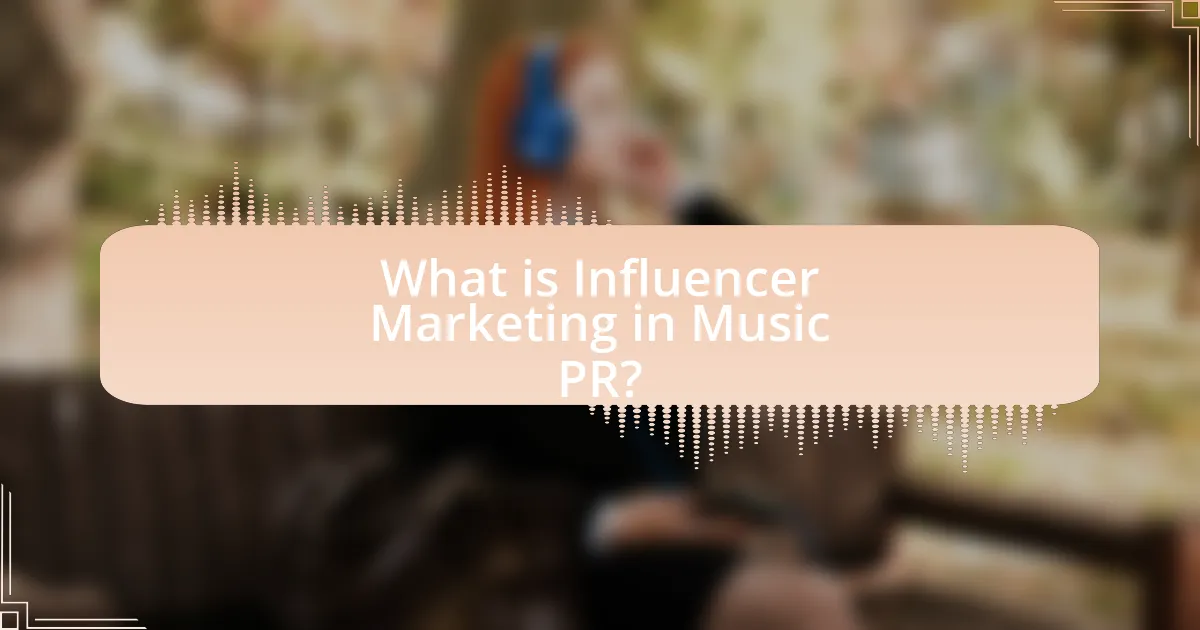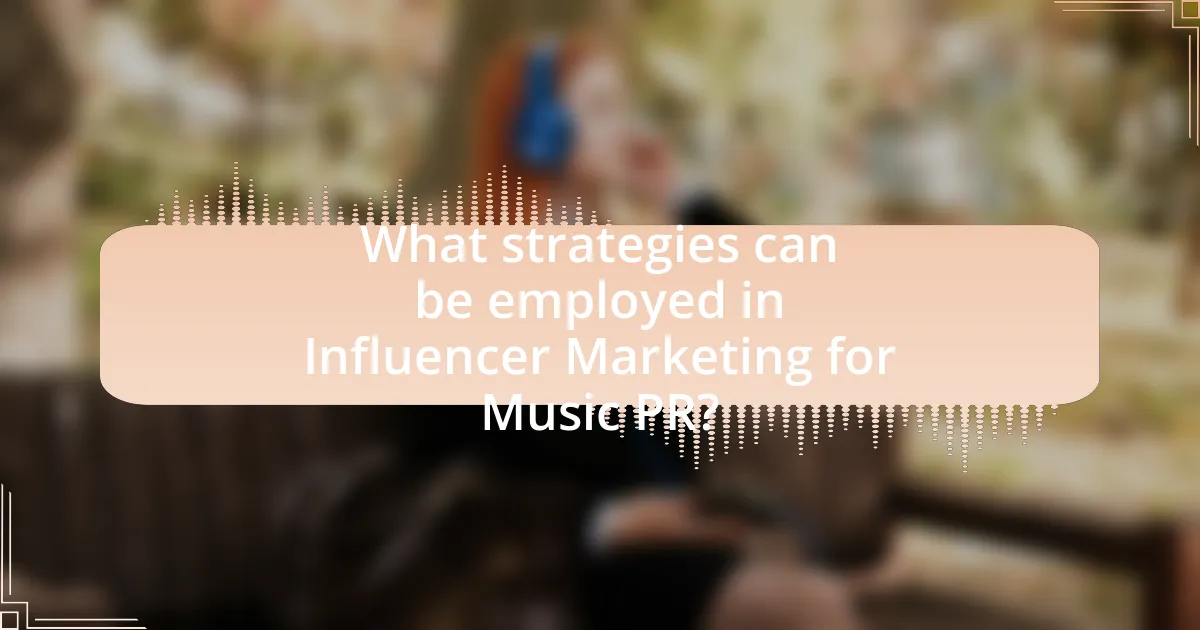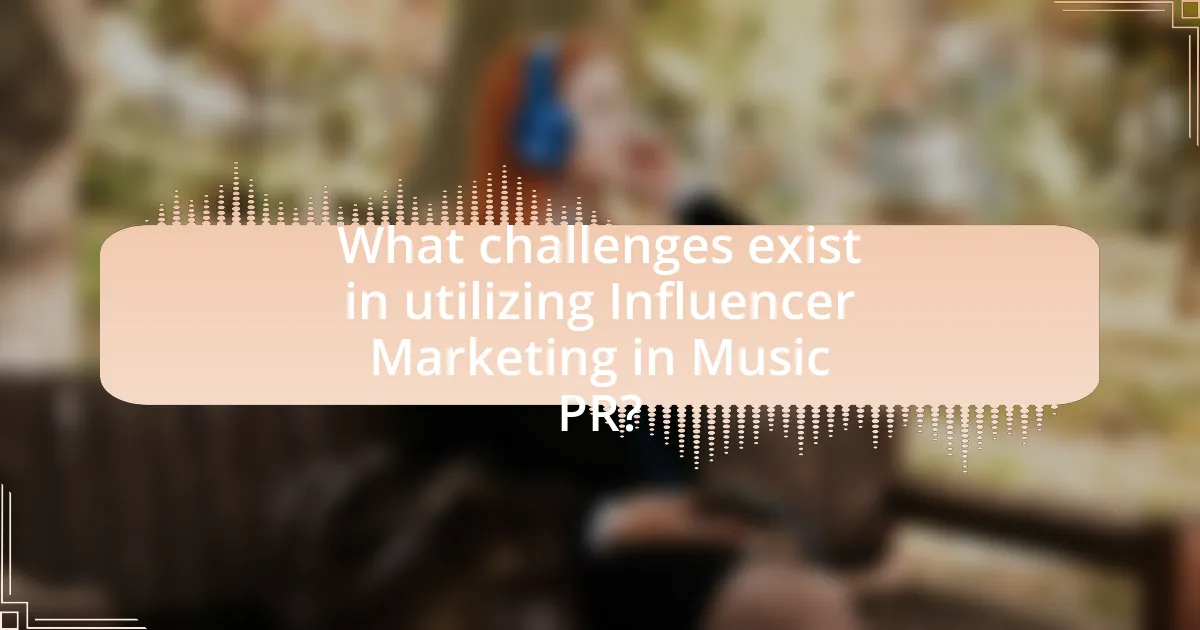Influencer marketing in music PR is a strategic approach that utilizes the reach and credibility of social media influencers to promote music and artists. This article explores how influencer marketing integrates with music PR, detailing the roles influencers play in enhancing visibility, audience engagement, and driving sales for musicians. It also addresses the importance of selecting the right influencers, the types of content that can be created, and the challenges faced in this marketing strategy. Additionally, it outlines best practices for musicians to build authentic relationships with influencers and measure the success of their campaigns, emphasizing the growing significance of this method in the music industry.

What is Influencer Marketing in Music PR?
Influencer marketing in music PR is a strategy that leverages the reach and credibility of social media influencers to promote music and artists. This approach allows musicians to connect with target audiences through trusted voices, enhancing visibility and engagement. According to a 2021 report by Influencer Marketing Hub, 63% of marketers plan to increase their influencer marketing budgets, indicating its growing importance in promotional strategies. By collaborating with influencers, artists can effectively tap into niche markets and generate buzz around new releases, ultimately driving streams and sales.
How does Influencer Marketing integrate with Music PR?
Influencer marketing integrates with music PR by leveraging social media influencers to amplify an artist’s reach and engagement. Influencers, who have established credibility and a dedicated following, can promote music releases, concerts, and brand partnerships, thereby enhancing visibility and driving audience interaction. For instance, a study by the Digital Marketing Institute found that 49% of consumers depend on influencer recommendations, highlighting their effectiveness in shaping public perception and consumer behavior in the music industry. This synergy allows music PR campaigns to tap into niche audiences, creating authentic connections that traditional marketing methods may not achieve.
What roles do influencers play in promoting music?
Influencers play a crucial role in promoting music by leveraging their large followings to amplify artists’ visibility and reach. They create engaging content that showcases new music, often through platforms like Instagram, TikTok, and YouTube, where they can directly connect with their audience. For instance, a study by the Digital Marketing Institute found that 49% of consumers depend on influencer recommendations when making purchase decisions, highlighting the effectiveness of influencers in driving music consumption. Additionally, influencers often participate in music challenges or trends, which can lead to viral exposure for songs, significantly increasing streaming numbers and chart performance.
How do influencers impact audience engagement in music PR?
Influencers significantly enhance audience engagement in music PR by leveraging their established credibility and reach within specific demographics. Their ability to create authentic connections with followers leads to increased visibility and interaction with music content. For instance, a study by the Influencer Marketing Hub found that 49% of consumers depend on influencer recommendations, which directly translates to higher engagement rates for music campaigns. Additionally, influencers often generate user-generated content, fostering community involvement and deeper emotional connections to the music, thereby amplifying overall audience engagement.
Why is Influencer Marketing important for musicians?
Influencer marketing is important for musicians because it enhances their visibility and engagement with target audiences. By collaborating with influencers who have established credibility and a dedicated following, musicians can reach potential fans more effectively than through traditional marketing methods. For instance, a study by Nielsen found that 92% of consumers trust recommendations from individuals over brands, highlighting the effectiveness of influencer endorsements. This strategy not only increases awareness of a musician’s work but also fosters a sense of community and connection with fans, ultimately driving sales and streaming numbers.
What advantages does Influencer Marketing provide to emerging artists?
Influencer marketing provides emerging artists with increased visibility and access to targeted audiences. By collaborating with influencers who have established followings, artists can leverage these platforms to reach potential fans who are already engaged in similar genres or styles. For instance, a study by the Digital Marketing Institute found that 49% of consumers depend on influencer recommendations when making purchasing decisions, highlighting the effectiveness of influencer endorsements in driving engagement and interest. This strategic approach not only enhances brand awareness for the artist but also fosters authentic connections with listeners, ultimately leading to increased streaming, sales, and concert attendance.
How does Influencer Marketing enhance brand visibility for musicians?
Influencer marketing enhances brand visibility for musicians by leveraging the established audiences of influencers to reach potential fans. When musicians collaborate with influencers, they gain access to a wider demographic that may not be familiar with their work, thereby increasing exposure. For instance, a study by the Digital Marketing Institute found that 49% of consumers depend on influencer recommendations, highlighting the effectiveness of this strategy in driving awareness. Additionally, influencers often create engaging content that showcases the musician’s brand, leading to higher engagement rates and organic sharing, which further amplifies visibility.

What strategies can be employed in Influencer Marketing for Music PR?
Influencer marketing strategies for music PR include leveraging social media platforms, collaborating with relevant influencers, and creating engaging content that resonates with target audiences. Social media platforms like Instagram, TikTok, and YouTube are essential for reaching diverse demographics, as they allow artists to showcase their music through visually appealing content. Collaborating with influencers who have a genuine connection to the music genre can enhance credibility and expand reach; for instance, artists partnering with popular TikTok creators can lead to viral trends that promote their songs. Engaging content, such as behind-the-scenes footage, live performances, and interactive Q&A sessions, fosters a deeper connection with fans and encourages sharing, amplifying the artist’s visibility. These strategies are supported by data indicating that influencer marketing can yield an ROI of up to 11 times the initial investment, demonstrating its effectiveness in the music industry.
How can musicians identify the right influencers for their brand?
Musicians can identify the right influencers for their brand by analyzing the influencer’s audience demographics, engagement rates, and content relevance. This process involves researching influencers who align with the musician’s genre and target audience, ensuring that their followers are likely to be interested in the musician’s work. For instance, a study by Influencer Marketing Hub found that 63% of marketers believe that audience engagement is more important than follower count when selecting influencers. By focusing on influencers who have a genuine connection with their audience and produce content that resonates with the musician’s brand, musicians can effectively enhance their visibility and reach within their desired market.
What criteria should be considered when selecting influencers?
When selecting influencers, key criteria include audience alignment, engagement rates, authenticity, and content quality. Audience alignment ensures that the influencer’s followers match the target demographic of the music PR campaign, which is crucial for effective messaging. Engagement rates, measured through likes, comments, and shares, indicate how actively the influencer’s audience interacts with their content, reflecting the influencer’s ability to drive conversations. Authenticity is vital, as influencers who genuinely connect with their audience foster trust, making their endorsements more impactful. Lastly, content quality refers to the aesthetic and relevance of the influencer’s posts, which should resonate with the music brand’s image and values. These criteria collectively enhance the effectiveness of influencer partnerships in music PR campaigns.
How can audience demographics influence influencer selection?
Audience demographics significantly influence influencer selection by ensuring that the chosen influencer resonates with the target audience’s age, gender, location, and interests. For instance, if a music PR campaign aims to reach a younger audience, selecting influencers who primarily engage with that demographic on platforms like TikTok or Instagram is crucial. Research indicates that 60% of consumers are more likely to trust influencers who share similar characteristics or backgrounds, highlighting the importance of aligning influencer profiles with audience demographics for effective engagement.
What types of content can be created through Influencer Marketing?
Influencer marketing can create various types of content, including sponsored posts, product reviews, unboxing videos, social media stories, and live streams. Sponsored posts feature influencers promoting a brand or product directly to their audience, while product reviews provide authentic feedback on items, enhancing credibility. Unboxing videos showcase the experience of receiving and opening products, generating excitement. Social media stories allow influencers to share real-time updates and engage followers, and live streams facilitate direct interaction between influencers and their audience, fostering community. These content types leverage the influencer’s reach and authenticity to effectively promote music-related products and services.
How can music videos benefit from influencer collaborations?
Music videos can significantly benefit from influencer collaborations by leveraging the influencer’s established audience to enhance visibility and engagement. Influencers possess dedicated followings that trust their recommendations, which can lead to increased views and shares of the music video. For instance, a study by Influencer Marketing Hub found that influencer marketing can yield an ROI of $5.78 for every dollar spent, demonstrating the financial effectiveness of such collaborations. Additionally, influencers can create authentic content that resonates with their audience, making the music video more relatable and appealing. This synergy not only amplifies the reach of the music video but also fosters a deeper connection with potential fans, ultimately driving higher engagement and streaming numbers.
What role do social media posts play in music promotion?
Social media posts are crucial in music promotion as they facilitate direct engagement between artists and their audience. These posts allow musicians to share updates, new releases, and personal insights, fostering a sense of community and connection. According to a study by the International Journal of Music Business Research, 70% of music consumers discover new music through social media platforms, highlighting their effectiveness in reaching potential fans. Additionally, social media enables targeted advertising, allowing artists to reach specific demographics, which can significantly enhance their promotional efforts.

What challenges exist in utilizing Influencer Marketing in Music PR?
Utilizing influencer marketing in music PR presents several challenges, including authenticity issues, audience alignment, and measurement of effectiveness. Authenticity is crucial, as audiences can quickly detect insincerity, leading to backlash against both the influencer and the artist. For instance, a study by the Digital Marketing Institute found that 63% of consumers trust influencers less if they perceive them as inauthentic. Audience alignment is another challenge; selecting influencers whose followers do not match the target demographic can result in wasted resources and ineffective campaigns. Additionally, measuring the effectiveness of influencer partnerships can be complex, as traditional metrics may not accurately reflect engagement or conversion rates in the music industry. According to a report by Influencer Marketing Hub, 49% of marketers struggle to measure ROI from influencer marketing, highlighting the difficulty in assessing the true impact of these campaigns.
What common pitfalls should musicians avoid in Influencer Marketing?
Musicians should avoid the common pitfalls of misaligned partnerships, lack of authenticity, and neglecting audience engagement in influencer marketing. Misaligned partnerships occur when musicians collaborate with influencers whose audience does not match their target demographic, leading to ineffective campaigns. For instance, a rock musician partnering with a beauty influencer may not resonate with the latter’s followers, resulting in low engagement and poor return on investment. Lack of authenticity can damage a musician’s credibility; audiences are more likely to respond positively to genuine endorsements rather than forced promotions. Additionally, neglecting audience engagement, such as failing to interact with followers or ignoring feedback, can diminish the effectiveness of influencer marketing efforts. Engaging with the audience fosters a sense of community and loyalty, which is crucial for successful marketing.
How can misalignment between influencers and artists affect campaigns?
Misalignment between influencers and artists can significantly undermine the effectiveness of marketing campaigns. When influencers do not resonate with an artist’s brand or target audience, the campaign may fail to engage potential fans, leading to lower reach and engagement rates. For instance, a study by Influencer Marketing Hub found that campaigns with aligned influencer-artist partnerships achieved 11 times higher ROI compared to misaligned ones. This misalignment can also result in negative perceptions of the artist, as audiences may view the collaboration as inauthentic or forced, further diminishing the campaign’s impact.
What are the risks of relying too heavily on influencer partnerships?
Relying too heavily on influencer partnerships poses several risks, including brand misalignment, loss of authenticity, and dependency on external factors. Brand misalignment occurs when an influencer’s values or audience do not match the brand’s identity, potentially leading to negative perceptions among consumers. Loss of authenticity can arise if audiences perceive influencer promotions as insincere, which can diminish trust and engagement. Additionally, dependency on influencers can create vulnerabilities; for instance, if an influencer faces a scandal or changes their focus, it can adversely affect the brand’s visibility and reputation. According to a 2021 survey by the Digital Marketing Institute, 61% of marketers reported that influencer partnerships can backfire if not carefully managed, highlighting the importance of strategic alignment and risk assessment in influencer marketing.
How can musicians measure the success of their Influencer Marketing efforts?
Musicians can measure the success of their Influencer Marketing efforts by analyzing key performance indicators (KPIs) such as engagement rates, reach, and conversion metrics. Engagement rates, which include likes, shares, and comments on posts featuring the musician’s content, provide insight into audience interaction and interest. Reach indicates how many unique users have seen the influencer’s content, helping musicians understand the potential audience size. Conversion metrics, such as the number of streams, downloads, or ticket sales generated from the campaign, directly reflect the effectiveness of the marketing efforts. According to a study by Influencer Marketing Hub, campaigns that effectively track these metrics can yield an average return on investment of $5.78 for every dollar spent, demonstrating the tangible impact of influencer collaborations.
What metrics are essential for evaluating campaign effectiveness?
Key metrics for evaluating campaign effectiveness include return on investment (ROI), engagement rate, reach, conversion rate, and brand awareness. ROI measures the financial return relative to the campaign cost, providing a clear indication of profitability. Engagement rate assesses how actively the audience interacts with the content, reflecting its resonance. Reach quantifies the total number of unique individuals exposed to the campaign, indicating its visibility. Conversion rate tracks the percentage of users who take a desired action, such as making a purchase or signing up for a newsletter, demonstrating the campaign’s effectiveness in driving actions. Brand awareness metrics, such as surveys or social media mentions, gauge the campaign’s impact on audience recognition and perception of the brand. These metrics collectively provide a comprehensive view of campaign performance, enabling informed decision-making in influencer marketing strategies within music PR.
How can feedback from influencers and audiences inform future strategies?
Feedback from influencers and audiences can significantly inform future strategies by providing insights into preferences and trends. This feedback allows music PR teams to understand what resonates with their target demographic, enabling them to tailor campaigns more effectively. For instance, data from surveys or social media interactions can reveal which types of content generate the most engagement, guiding the selection of promotional materials and messaging. Additionally, influencers often have their finger on the pulse of emerging trends, and their input can help identify new opportunities for collaboration or innovative marketing approaches. By analyzing this feedback, music PR professionals can refine their strategies to enhance audience connection and drive successful outcomes.
What best practices should musicians follow for effective Influencer Marketing?
Musicians should focus on building authentic relationships with influencers to achieve effective influencer marketing. Establishing genuine connections allows musicians to collaborate with influencers who resonate with their brand and audience, enhancing credibility and engagement. For instance, a study by the Digital Marketing Institute found that 70% of millennials are influenced by the recommendations of their peers, highlighting the importance of trust in influencer partnerships. Additionally, musicians should select influencers whose audience demographics align with their target market, ensuring that promotional efforts reach the right listeners. Engaging influencers in creative campaigns, such as exclusive content or behind-the-scenes access, can further amplify reach and foster a sense of community among fans.
How can musicians build authentic relationships with influencers?
Musicians can build authentic relationships with influencers by engaging genuinely and consistently with them. This involves actively participating in their content, sharing insights, and providing value, which fosters trust and mutual respect. For instance, musicians can comment on influencers’ posts, collaborate on projects, or invite them to exclusive events, creating a sense of community. Research indicates that 70% of consumers are more likely to trust a brand when it is endorsed by an influencer they follow, highlighting the importance of authentic connections in influencer marketing.
What are the key elements of a successful influencer campaign in music PR?
The key elements of a successful influencer campaign in music PR include selecting the right influencers, establishing clear objectives, creating engaging content, and measuring campaign effectiveness. Selecting the right influencers ensures alignment with the artist’s brand and target audience, which is crucial for authenticity and reach. Establishing clear objectives, such as increasing streams or social media engagement, provides direction and focus for the campaign. Creating engaging content that resonates with the influencer’s audience enhances the likelihood of sharing and interaction. Finally, measuring campaign effectiveness through analytics and feedback allows for assessment of success and areas for improvement, ensuring that the campaign meets its goals.